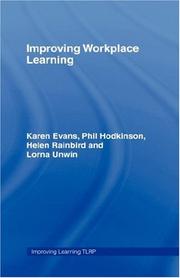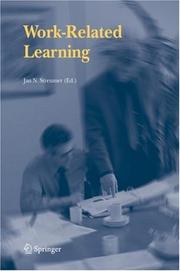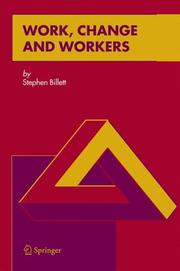| Listing 1 - 5 of 5 |
Sort by
|

ISBN: 9780415371193 9780415371209 0415371201 0415371198 9780203946947 9781134196487 9781134196524 9781134196531 Year: 2006 Publisher: London Routledge
Abstract | Keywords | Export | Availability | Bookmark
 Loading...
Loading...Choose an application
- Reference Manager
- EndNote
- RefWorks (Direct export to RefWorks)
Organizational learning. --- Knowledge management. --- Employees --- Apprentissage organisationnel --- Gestion des connaissances --- Personnel --- Training of. --- Formation --- Knowledge management --- Organizational learning --- Learning organizations --- Learning --- Communities of practice --- Management of knowledge assets --- Management --- Information technology --- Intellectual capital --- Employee development --- Employee training --- Employees, Training of --- In-service training --- Inservice training --- On-the-job training --- Training of employees --- Training within industry --- Vestibule schools --- Occupational training --- Employer-supported education --- Training of

ISBN: 1280722398 9786610722396 0787986976 9780787986971 0787985333 9780787985332 6610722390 9781280722394 Year: 2006 Publisher: San Francisco : Pfeiffer,
Abstract | Keywords | Export | Availability | Bookmark
 Loading...
Loading...Choose an application
- Reference Manager
- EndNote
- RefWorks (Direct export to RefWorks)
This important resource translates the popular Six Sigma methodologies, tools, and techniques in a way that is customized specifically for the design, implementation, and measurement of employee development programs. A proven alternative to the Kirkpatrick Model, this new model offers a more effective method for designing and testing the effectiveness of training. Throughout the book, the author presents tools in a user-friendly and understandable format that is tailored for implementation in the development and measurement of employee learning programs. Step-by-step, Developing a
Employees --- Six sigma (Quality control standard) --- Quality control --- Employee development --- Employee training --- Employees, Training of --- In-service training --- Inservice training --- On-the-job training --- Training of employees --- Training within industry --- Vestibule schools --- Occupational training --- Employer-supported education --- Training of. --- Standards --- Training of --- E-books

ISBN: 1280462078 9786610462070 1402039395 1402037651 9048169550 Year: 2006 Publisher: Dordrecht : Springer Netherlands : Imprint: Springer,
Abstract | Keywords | Export | Availability | Bookmark
 Loading...
Loading...Choose an application
- Reference Manager
- EndNote
- RefWorks (Direct export to RefWorks)
Work-related learning (WRL) is a topic of steadily increasing interest to today’s vocational education institutions as well as organizations in business and industry. This book derives from an international HRD conference held at the University of Twente, The Netherlands. Key papers from the conference have been combined with other high-standard contributions. Together they offer an international collection of leading edge research. The book brings together contributors from various parts of the EU and the USA and includes examples of good practice and recent research on work-related learning. Work-related learning can be broadly seen to be concerned with all forms of education and training closely related to the daily work of (new) employees, and is increasingly playing a central role in the lives of individuals, groups or teams and the agenda’s of organizations. However, as this area of study becomes more prominent, debates have opened about the nature of the field, as well as about its configurations and effects. For example, some authors have a broad definition of WRL and define it as learning for work, at work and through work, ranging from formal, through semi-structured to informal learning. Others prefer to use the concept of WRL mainly in connection to informal, incidental learning processes during work, leading to competent workplace learners. Formal and informal learning are distinguished from each other with respect to the level of intention (implicit/non-intentional/incidental versus deliberative/intentional/structured). Another point of discussion originates from the different ‘theoretical backgrounds’ of the authors: the ‘learning theorists’ versus the ‘organizational theorists’. The first group is mainly interested in the question of how learning comes about; the second group is predominantly interested in the search for factors affecting learning. This book is essential reading for practitioners, researchers, teachers and students in the HRM and HRD field as well as in the field of VET.
Employees --- Education --- Training of. --- Experimental methods. --- Employee development --- Employee training --- Employees, Training of --- In-service training --- Inservice training --- On-the-job training --- Training of employees --- Training within industry --- Vestibule schools --- Occupational training --- Employer-supported education --- Experimental methods in education --- Educational innovations --- Education, general. --- Professional & Vocational Education. --- Education. --- Professional education. --- Vocational education. --- Education, Vocational --- Vocational training --- Work experience --- Technical education --- Education, Professional --- Career education --- Education, Higher --- Children --- Education, Primitive --- Education of children --- Human resource development --- Instruction --- Pedagogy --- Schooling --- Students --- Youth --- Civilization --- Learning and scholarship --- Mental discipline --- Schools --- Teaching --- Training

ISBN: 1280612797 9786610612796 1402046510 140204643X 9781402046438 Year: 2006 Publisher: Dordrecht : Springer Netherlands : Imprint: Springer,
Abstract | Keywords | Export | Availability | Bookmark
 Loading...
Loading...Choose an application
- Reference Manager
- EndNote
- RefWorks (Direct export to RefWorks)
This book provides a fresh account of the changing nature of work and how workers are changing as result of the requirements of contemporary working life. It explores the implications for preparing individuals for work and maintaining their skills throughout working life. This is done by examining the relations between the changing requirements for working life and how individuals engage in work. An analysis that engages the psychological, sociological, philosophical and anthropological literatures as they relate to work as well as recent empirical research that examines and elaborates perspectives of work and work practice as social institutions and as a vocation that individuals exercise with intentionality and agency. So a key basis for considering changing work and changing workers is the relationships between the social institutions and cultural needs and practices that necessitates and constitutes paid work and how individuals engage and elect to participate and learn in that work. Implications for vocational education, professional development and on-going learning throughout working life are addressed. These include developing skills in educational institutions, workplaces, and combinations thereof and in times when both government and employers are looking for others to sponsor that development and maintaining the competence and engagement of older workers.
Work --- Organizational change. --- Social change. --- Employees --- Social aspects. --- Training of. --- Employee development --- Employee training --- Employees, Training of --- In-service training --- Inservice training --- On-the-job training --- Training of employees --- Training within industry --- Vestibule schools --- Occupational training --- Employer-supported education --- Change, Social --- Cultural change --- Cultural transformation --- Societal change --- Socio-cultural change --- Social history --- Social evolution --- Change, Organizational --- Organization development --- Organizational development --- Organizational innovation --- Management --- Organization --- Manpower planning --- Sociology of work --- Adult education. Lifelong learning --- Education, general. --- Professional & Vocational Education. --- Learning & Instruction. --- Organizational change --- Social change --- Training of --- Social aspects --- Education. --- Professional education. --- Vocational education. --- Learning. --- Instruction. --- Education, Professional --- Career education --- Education, Higher --- Technical education --- Children --- Education, Primitive --- Education of children --- Human resource development --- Instruction --- Pedagogy --- Schooling --- Students --- Youth --- Civilization --- Learning and scholarship --- Mental discipline --- Schools --- Teaching --- Training --- Learning process --- Comprehension --- Education --- Education, Vocational --- Vocational training --- Work experience

ISBN: 9781402053597 1402053592 1402053606 9781402053603 1280938137 9786610938131 9048173523 Year: 2006 Volume: 6 Publisher: Dordrecht : Springer Netherlands : Imprint: Springer,
Abstract | Keywords | Export | Availability | Bookmark
 Loading...
Loading...Choose an application
- Reference Manager
- EndNote
- RefWorks (Direct export to RefWorks)
In recent year, efforts to understand learning for and throughout working life have moved away from a focus on workplace training to concerns about learning as a component and outcome of engaging in work and work-related activities and interactions. This shift acknowledges a broader set of workplace factors that shape workers’ learning and development. Yet equally, it acknowledges that this learning through engagement is also necessarily shaped by the diverse ways that individuals elect to engage or participate in workplace activities. Central here is the issue of individuals’ subjectivity and how this is shaped by but shapes engagement in work and, therefore, what learning flows from their participation. It is in considering the relations among subjectivity, learning and work that it is possible to advance both the conceptual and procedural bases for understanding learning through and for working life. Moreover, the focus on relations among subjectivity, work and learning represents a point of convergence for diverse disciplinary traditions and practices that are provided by the book’s contributors. In this way, the contributions represent something of the emerging perspectives that are elaborating the complex relations among subjectivity, work and learning, and circumstances in which they are played out.
Adult education. Lifelong learning --- Employees --- Organizational change --- Work --- Change, Organizational --- Organization development --- Organizational development --- Organizational innovation --- Management --- Organization --- Manpower planning --- Employee development --- Employee training --- Employees, Training of --- In-service training --- Inservice training --- On-the-job training --- Training of employees --- Training within industry --- Vestibule schools --- Occupational training --- Employer-supported education --- Training of --- Social aspects --- Organizational change. --- Social aspects. --- Training of. --- Professional & Vocational Education. --- Educational Policy and Politics. --- Learning & Instruction. --- Sociology of Education. --- Professional education. --- Vocational education. --- Educational policy. --- Education and state. --- Learning. --- Instruction. --- Educational sociology. --- Learning process --- Comprehension --- Education --- Education and sociology --- Social problems in education --- Society and education --- Sociology, Educational --- Sociology --- Education policy --- Educational policy --- State and education --- Social policy --- Endowment of research --- Education, Vocational --- Vocational training --- Work experience --- Technical education --- Education, Professional --- Career education --- Education, Higher --- Aims and objectives --- Government policy
| Listing 1 - 5 of 5 |
Sort by
|

 Search
Search Feedback
Feedback About
About Help
Help News
News